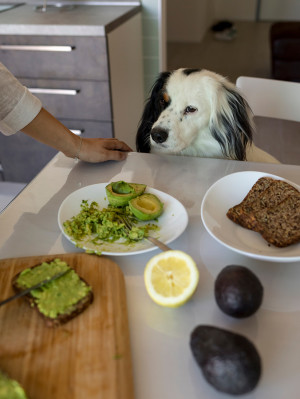Can Dogs Eat Blackberries? The Ultimate Guide to Safe Snacking
Your pup’s berry survival guide

Share Article
Let’s be honest – we’ve all been there. You’re enjoying a bowl of fresh blackberries when those irresistible puppy eyes lock onto your snack. The good news? You can absolutely let your furry best friend in on the berry action, though there are definitely some ground rules to follow.
As pet parents, it’s only natural that we want to share our favourite foods with our four-legged family members. But navigating the minefield of what’s safe and what isn’t can feel overwhelming – especially when blackberries seem to grow everywhere from garden bushes to wild hedgerows, practically begging to be taste-tested on walks. Understanding the facts before your dog decides to help themselves is absolutely crucial for keeping them healthy and happy.
Blackberries, with their sweet flavour and high nutritional value, are popular among people, but can dogs eat them too? The answer is a resounding yes – blackberries can be a tasty, low-calorie treat for dogs when given in moderation. These purple gems are packed with vitamins, minerals, antioxidants and other nutrients that can benefit your dog’s health. However, it’s essential to be aware of the potential risks that come with feeding your pup blackberries, particularly when enthusiasm gets the better of portion control, and to know exactly which parts of the fruit are safe for dogs to enjoy.
Whether you’re looking to jazz up your dog’s treat repertoire or simply want to know more about the impact of blackberries on their health, this guide will help you make informed decisions about your pet’s nutritionopens in new tab.
Can dogs eat blackberries?
The short answer is absolutely yes – blackberries are completely safe for dogs. My dogs will often snaffle them straight from the bush before I even get a look in. They make an ideal tasty treat, but as with absolutely everything in the dog world, moderation is your best friend here.
Nutrition facts: blackberries for dogs
Blackberries are low in calories, but don’t let those tiny, juicy packages fool you – they’re absolutely bursting with goodness. They’re loaded with fibre and essential fatty acids and are particularly rich in minerals such as potassium, iron, magnesium and calcium. They also contain a plethora of vitamins that would make a nutritionist jump for joy, including A, B, C, E and K, and that rich, purple colour that makes blackberries look so inviting isn’t just for show – it comes from anthocyanins, which just so happen to be potent antioxidantsopens in new tab.
Are blackberries good for dogs?
Remember, we’re talking about treats here – small amounts that complement rather than dominate your dog’s diet. But even in modest portions, these tiny berries pack an impressive nutritional punch alongside their irresistibly juicy flavour:
They are lower in calories and sugars than many dog treats.
Anti-oxidants, such as anthocyanin, have a natural anti-inflammatory effectopens in new tab and boost memory and brain function.
Fibre is an important component of a dog’s diet. It not only keeps them regular, reducing problems with loose stools, but also helps to reduce anal gland issues. Fibre also creates a feeling of fullness, so can help reduce appetite, preventing overeating and obesity.
With many dogs being fed a primarily meat-based diet, plant-based treats can help increase the amount of vitamins and minerals in your dog’s dietopens in new tab. These nutrients can provide a vast array of health benefits, from improving cardiovascular health and brain function, boosting immunity and metabolism, and reducing inflammation.
Omega 3 is one of a number of fatty acids that helps to keep your pet’s skin and coat looking healthy and shiny. It can also help to reduce the pain and inflammation associated with arthritis.
Can dogs eat wild blackberries?
This is where things get particularly exciting for adventurous dog parents and their equally adventurous pups. Wild blackberries are generally just as safe as their shop-bought cousins, often packing even more intense flavour and sometimes higher concentrations of beneficial nutrients due to their growing conditions.
However, foraging comes with its own considerations. You need to be confident you’re dealing with actual blackberries rather than another dark berry that could be harmful. If plant identification isn’t your strong suit, best stick to what you know is definitely safe.
Location is everything when it comes to wild blackberries. Avoid picking from areas that may have been treated with chemicals, are close to busy roads (no one wants a dusty, polluted berry) or popular walking spots where dogs and other small animals might frequently relieve themselves. No berry is worth that particular risk.
As you may have learned the hard way, the thorns on wild blackberry bushes can be absolutely vicious, so keep your dog well clear while you do the harvesting. Your dog might think they can dive in head first, but those thorns can cause nasty cuts or get stuck in paws and fur. Better for the human to be the designated picker (a great time to practise your ‘place’ or ‘stay’ cues with your dog) and share the spoils safely after you’ve gathered your harvest.
Can dogs eat all blackberry parts?
Blackberries are so safe that if your pet felt inclined, they could nibble the leaves and stem of the bush itself without ill effects, however the brambles can cause nasty lacerations so it’s sensible to keep your dog away from the barbs. Blackberries should be fed fresh, ensuring they are free from mould and decay. Avoid using preserved or chemically modified products, such as jams or syrups, which contain a much higher sugar content or even toxic compounds such as xylitol.
Are blackberries completely safe for dogs?
Remember; everything in moderation. Too many blackberries can upset your dog’s sensitive gastrointestinal system and lead to weight gain. The berries contain tiny amounts of natural xylitol, the sweetener which is toxic to dogs, so if vast amounts were consumed in a small amount of time your dog could suffer from life threatening low blood sugar.
Other fruits that are good for dogs
Feeding certain human foods as treats is a great, healthy way of enriching your pet’s diet. Blackberries are not the only snack you can offer your dog. In fact there are a whole host of fruits that serve as a tasty treat for your four legged friend.
Blueberries are another tasty low-calorie snack.
Bananas can be consumed and used for things like filled Kongs.
Pineapple is a refreshing treat for dogs.
Fruits that are dangerous for dogs
Not all human foods are safe. In fact some can be incredibly toxic:
Fruits such as grapes, currants and raisins should never be given to dogs.
Garlic and onions can cause your pet to become very ill if fed in large quantities.
Avocado is also a no-no for dogs due to the persin content being toxic for pups.
The bottom line: can dogs eat human food?
Some human foods are not only safe but actually beneficial for your dog when fed in moderation. They can make a cost effective, healthy alternative to some higher calorie dog treats. If you are at all unsure what is safe to feed your dog then always check with your vet first.
Frequently asked questions: can dogs eat blackberries?
Can I give my dog blackberries every day?
Yes, as long as given in moderation blackberries can be fed daily, and why pass up on the opportunity to make use of a treat that literally grows on trees (well, bushes…).
How many blackberries can a dog eat?
This will depend on the size of your dog. Blackberries contain sugar so are considered treats. Treats should make up no more than 10 percent of your pet’s daily calorie intake.
Are blackberries toxic to dogs?
Blackberries are very safe – even the leaves and stems pose negligible risk of toxicity, however be certain to take care that your dog doesn’t injure themselves on the bramble barbs.
What happens if my dog eats too many blackberries?
This is almost impossible, however in theory your dog, especially if they are very small, could get xylitol poisoning, resulting in dangerously low blood sugar. If they are fed too many over a longer period it could lead to weight gain, however blackberries are generally a very safe option for dogs.
Why do dogs like blackberries?
Dogs have a habit of stealing whatever it is that we are eating, and with blackberries being so juicy and sweet, it’s no wonder our canine companions want to share them. However, their love of blackberries goes far beyond their desire to pilfer our pickings; a dog's sense of smell is an incredibly important way for them to interact with their surroundings and studies have shown that dogs actually have favourite smellsopens in new tab, with blackberries ranking near the top.
Note: while caution was taken to give safe recommendations and accurate instructions in this article, it is impossible to predict an individual dog’s reaction to any food or ingredient. Readers should consult their vets and use personal judgement when applying this information to their own dogs’ diets.
Resources:
Canine Smell Preferences—Do Dogs Have Their Favorite Scents?opens in new tab
Blackberries and Mulberries: Berries with Significant Health-Promoting Propertiesopens in new tab
Oxidative stress and food supplementation with antioxidants in therapy dogs - PMCopens in new tab
Roles of plant-based ingredients and phytonutrients in canine nutrition and healthopens in new tab
Can Dogs Eat Blackberries? – American Kennel Clubopens in new tab

Dr Nina Blackmore, MRCVS, BVSc, PgCertSAECC
Nina Blackmore is a vet who, after leaving the Royal Army Veterinary Corps, took up two very different lives. For four long, chaotic days each fortnight she lives in a tiny house next to a small animal veterinary hospital in Boston, managing hospitalised patients and treating any emergency cases that turn up. As well as emergencies she also has a keen interest in pain management and acupuncture. The rest of her time is spent in a quirky bungalow in Rutland where she and her husband run a self sufficient small holding and a dog home boarding business. She spends her life surrounded by animals and has made it her life goal to help as many as possible.
Related articles
Can Dogs Eat Avocado?
Hold the avo toast, please
![Golden retriever looks at some eggs on the counter]()
Can Dogs Eat Eggs?
Here’s how to get cracking
![Side view of a cute hungry dog standing next to a red bowl with food in a studio with white background]()
How to Get a Dog to Eat
You can’t appease a picky dog with chicken nuggets like you can with a toddler. Here are some things you can do
![Cheerful Brunette Having Fun With Her Dog Outside]()
Big Fish: The Best Omega-3 Supplements for Dogs (And Why They Need Them)
Fatty acids rev up your dog’s energy, keep their coat shiny, help with inflammation from allergies and arthritis, and so much more




